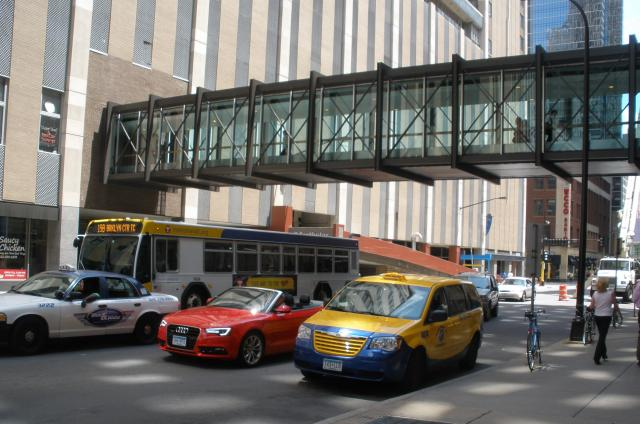
By Tim Redmond
So Twitter now wants a sky bridge connecting two office buildings, just to make sure that the workers never have to set foot out of the building or see anyone else. It’s importing the idea of the suburban “campus,” where everything is self-contained and nobody leaves (for lunch or anything else) to an urban setting.
Didn’t we give Twitter a tax break in part so that all of those workers in mid-Market would help revitalize the place? Instead, a study by the city’s economist, Ted Egan, shows that taxable sales (retail, restaurant etc.) in the tax-break area grew more slowly than other parts of the city – suggesting that the tax break may have been great for Twitter but no so much for local small businesses.
(Hey, they’re even putting a high-end supermarket in the Twitter building, so nobody will ever have to leave for anything.)
I’ve been arguing for a long time now that the essential problem with Ed Lee’s “jobs first” policy is that he never stopped to think about what the impacts would be on the rest of the city if he attracted a bunch of new tech businesses to Market Street. Already, nonprofits are being forced out (some of them funded by the city, which means the city will have to kick in more money for higher rent).
I don’t need to say anything more about the residential displacement impacts.
And now, the city itself if going to be spending an additional $74 million for an office building right off Market. You think that increased cost – which WAY wipes out any benefit from the Twitter tax break – isn’t related to the boom in mid-Market?
Not saying we shouldn’t have encouraged development on Market Street. But nothing in this town is free, and (as I’ve often found in the past) the costs of intensive office development can far exceed the benefits.
If Twitter wants a sky bridge, the company will be building over a city street, and the city owns the air rights. I hope Mayor Lee doesn’t just give that away free.
In other new-economy news, Uber – already in trouble over pricing strategies and liability – has drawn the interest of federal regulators who are checking out whether, to quote Valleywag, “Uber and its shady partners are pushing drivers into sub-prime loans.”
The subprime lending market that plunged America into the Great Recession is back and as unscrupulous as ever. Instead of mortgages, this time a bubble has formed around auto loans, and reliably ruthless Uber is in the thick of it. Two “partners” in Uber’s vehicle financing program are under federal investigation, but Uber hasn’t slowed its aggressive marketing campaign to get drivers with bad credit to sign up for loans.
So good to see the new economy works just like the old one.






